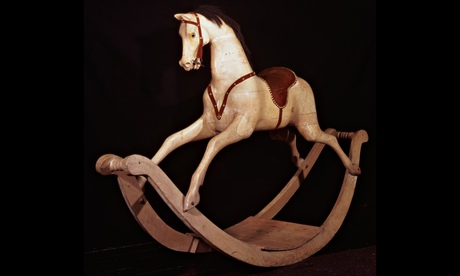
This week's poem by Jon Stallworthy comes from his 2004 collection, Body Language, in which it's placed in the section called Language rather than the one called Body. Perhaps this is purposely to remind us that storytelling is what drive bodies through time, even the wooden bodies of rocking-horses. Dreamhorse follows a sequence, Skyhorse, about legendary horses, but is not part of it, although casting an oblique glance back. Here is history not as declared on the battlefield and over millennia, but history as it might be murmured by the old clock in the family kitchen.
Stallworthy is the kind of formalist poet who likes to give form a run for its money. One of the pleasures of this poem, for me, is that the metrical irregularity acts as a kind of assertive shaping. When, in lines five and six of the second stanza, four beats are exchanged for three, it's as if an ancient nursery-rhyme had broken through to disrupt the poetic mechanism. The contrasted verbs "canter" and "groom" make rhythmic patterns in the fourth line suggesting the variety of the children's imaginative play, and the pace of the play itself.
The first stanza's diction is almost shockingly simple. The present participle of the appositional verb, "knocking down", appears four times. However, the verb is a rattle-bag of possible meanings. It's used when the auctioneer strikes his gavel to declare an item sold – the obvious meaning here. Items reduced in price are "knocked down", and so are coffin lids. (Perhaps Death with his scythe has been replaced by the auctioneer and his gavel?) That deceptively "little" hammer conjures other noises: the clopping hooves, the ticking clock, and even the demolition of the house. As in so many memorable nursery rhymes, the effect of the repetition is sinister and humorous.
In the third stanza, last-century gender stereotyping shapes the children's fantasies. For the girls, Laddie is "Black Beauty" from the realistic and morally improving pony-book classic: for the male narrator, he assumes mythical and historical proportions. "Copenhagen" was the name of the Duke of Wellington's war-horse and that reference reminds us of the cavalry's declining role in the two world wars of a newly "mechanised century". The horse that crossed "battlefield and frontier" and, as the Browning quote underlines, "grew old along with us", is the representative of a species once vital ("a horse-drawn century") and now sidelined.
Ruefully, playfully, the last stanza twists away from, then faces, an encounter with mortality. The triple rhyme-pattern of lines two-five in each stanza has often added rhythmical emphasis: here it adds both pathos and humour: "but horse-doctors today/ can keep old age at bay –/ in rocking horses, anyway." The qualification is nicely judged and contains the gist of the poem, the longevity of objects compared to the irreparable passing of the human generations. The rocking-horse, however, being a Dreamhorse, carries something of human value into the future. It has a new young rider now, with his own horse fantasies. The grandfather, mediating, jauntily resigns himself to the supporting part, offering the child a "leg up". The tone is friendly and casual, but the rhyme with "cut up" and "stirrup" has an edginess which, again, recalls the unsettling knock-knock of the auctioneer's hammer.
• Jon Stallworthy's new collection, War Poet, will be published by Carcanet next month.
Dreamhorse
Laddie, we called him, Laddie the horse
our father rescued from a house
the auctioneer was knocking down,
knocking down, knocking down,
his little hammer knocking down,
carriage clock and rocking horse.
Conceived in a horse-drawn century,
a foal delivered by carpentry
from the dark of a sapwood womb
to paint-shop and tack-room,
for children to canter and groom
in a mechanised century.
The girls' Black Beauty, my Bucephalus,
my Copenhagen, Pegasus –
responding to the spur
that drove him over
battlefield and frontier –
grew old along with us.
His mane receded. Cowboy spurs cut up
his flank. He lost a stirrup,
but horse-doctors today
can keep old age at bay –
in rocking horses, anyway.
Grandson, let me give you a leg up.

